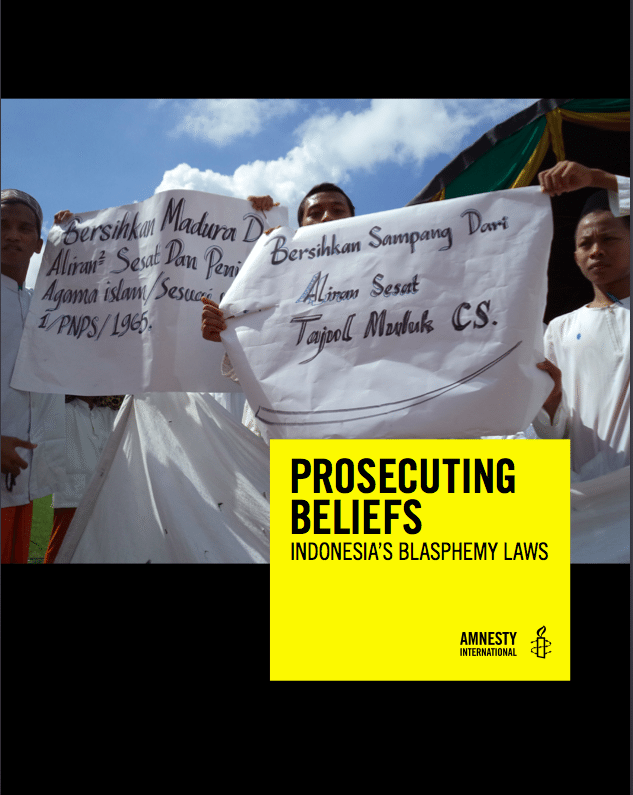Indonesian authorities have increasingly made use of a range of oppressive blasphemy laws to imprison individuals for their beliefs, contributing to an intensifying climate of intolerance in the country.
Prosecuting Beliefs shows that the number of blasphemy convictions skyrocketed during former President Susilo Bambang Yudhoyono’s decade in power (2004-2014) compared to previous administrations. Scores of individuals have been imprisoned – some for nothing more than whistling while praying, posting their opinions on Facebook or saying they had received a “revelation from God”.
Although Indonesia’s so-called “blasphemy law”, which is the law most commonly used to prosecute people for blasphemy, has been on the books since 1965 and is part of the Criminal Code, it was rarely used until President Yudhoyono took power.
Since 2004, Amnesty International has documented at least 106 individuals convicted under various blasphemy laws, some who have been imprisoned for up to five years. Many of those convicted are perceived as holding minority religious views and beliefs.
Blasphemy cases are mostly lodged at the local level, where political actors, hard-line Islamist religious groups and security forces often collude to target minorities. An accusation or rumor is sometimes enough to land a person in court on blasphemy charges. Many individuals are harassed or attacked by hard-line groups before their arrest, and tried in court in an intimidating atmosphere. The convictions are often justified on the basis of “maintaining public order”. The previous Indonesian administration failed to put an end to this practice.
The surge in blasphemy prosecutions should be seen in a wider context in which respect for freedom of religion has deteriorated. Over the past decade, minority groups have increasingly been targeted in mob violence or other attacks, with perpetrators rarely held to account.
The case of Tajul Muluk, a Shi’a Muslim religious leader from East Java who is currently serving a four-year sentence for blasphemy, is emblematic.
Tajul Muluk ran a religious boarding school in his home village of Sampang, when in 2006 local Sunni Muslim leaders began opposing his teachings as “deviant”. In December 2011, hundreds of Shi’a villagers were driven from their home in a mob attack. In March 2012, the local police launched a blasphemy case against Tajul Muluk, and he was sentenced to two years in prison, later extended to four years.
He remains in detention and most of his evicted Shi’a community have been barred from returning to their homes, with the government citing safety reasons but doing little to provide a comprehensive solution.
The blasphemy law has inspired a number of more recent laws that authorities use to clamp down on religious freedom. Indonesia’s law governing information on the internet (ITE Law) has, for example, been used to target people for “blasphemous” content posted on social media networks.
Alexander An, a 30-year old civil servant, was in June 2012 sentenced to two-and-half-years in prison for a post he had made on a local atheist group’s Facebook page earlier that year. Before his conviction, he had to be given police protection after an angry crowd showed up at his work place and threatened to beat him.
Indonesia’s blasphemy laws violate a range of the country’s international human rights commitments – including obligations to respect and protect the rights to freedom of expression, and freedom of religion or belief.

